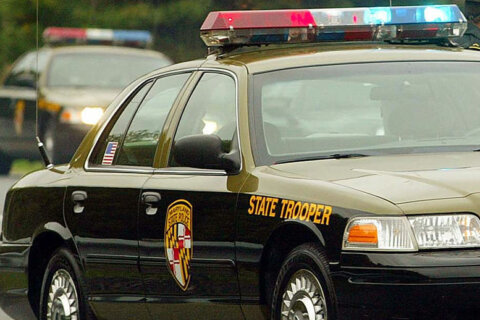This article was republished with permission from WTOP’s news partners at Maryland Matters. Sign up for Maryland Matters’ free email subscription today.
This content was republished with permission from WTOP’s news partners at Maryland Matters. Sign up for Maryland Matters’ free email subscription today.
The parking lot at the Mt. Pleasant Church and Ministries in East Baltimore, one of 96 early voting centers that opened in the state on Thursday morning, was a beehive of activity early in the day. Problem was, there weren’t too many voters there.
Inside, a training session for city election judge was underway, at the same time the church hosted a large funeral for a military veteran, which filled the parking lot with mourners. Confused campaign volunteers and candidates watched a flag-draped coffin go into the church in the early morning, then saw it come out closer to noon.
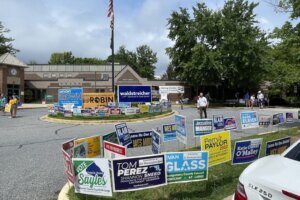
Who were all the well-dressed people in the parking lot?
“You don’t know whether they’re [voters] going to work or if they’re [mourners] going to the funeral,” said Del. Stephanie Smith (D-Baltimore City), one of a half dozen elected officials and candidates who had tents set up in the parking lot.
Everyone present said the voter turnout was slow. By the end of the day, just over 200 voters will have cast ballots at the church, with nearly 1,700 voters casting ballots across the city.
A preliminary report from the Maryland State Board of Elections showed 19,480 total votes cast at polling places across the state on the first day of early voting. That compares to 31,110 votes cast on the first day of early voting in the gubernatorial primary four years ago.
But a number of factors could be influencing turnout, including the mid-summer primary date that was delayed because of redistricting, and the rise of mail-in balloting during the COVID-19 era.
During the 2018 primary, the state sent out 42,324 mail-in ballots, with just over 30,000 returned by voters. By contrast, more than 477,000 mail ballots have been requested so far this year, and 25,129 had been returned as of Wednesday. (Voters can continue to request mail-in ballots by mail through July 12. After that date, mail-in ballots can be picked up at local elections offices.)
Early voting runs through July 14, with 96 centers around the state open daily from 7 a.m. to 8 p.m. Primary Election Day is July 19.
At the Mt. Pleasant voting location in Baltimore, Del. Talmadge Branch (D-Baltimore City), dressed in shorts and a Hawaiian shirt, had a big grin on his face as he stood next to the tent that his daughter, Del. Chanel Branch (D-Baltimore City), who is seeking a full term in the House after being appointed to a seat in 2020, had set up.
The elder Branch, on the other hand, chose not to seek reelection after 28 years in office.
“It feels wonderful,” Talmadge Branch said. “It definitely feels a little different. But I get a joy out of watching my daughter and the younger people run for their seats. After 28 years, it’s great to see the young people come along.”
One voter, 74-year-old Iva Cruse, said she was visiting the church on other business and wasn’t aware that it was the first day of early voting. But after being advised that she could cast her ballot on the spot, Cruse decided to take advantage, even though she conceded it was tough to keep track of all the candidates for governor because “there are too many of them. I’m not used to having all these different ones.”
Cruse, a lifelong Democrat, would not disclose who her pick for governor was, but said she was sorry Republican Gov. Lawrence J. Hogan Jr. wasn’t on the ballot again.
“He says something and he keeps his word, and that means a lot to me,” Cruse said. “That’s the opposite of what we’ve got in office right now.”
Another older woman, who refused to give her name, at first would not divulge her choice in the gubernatorial primary, but without pressing, finally allowed that she had voted for former Democratic National Committee Chair Tom Perez. The woman said she considered Perez the lesser of evils.
“I don’t really like none of them, especially for governor,” the voter said. “But I just had to pick one.”
The state senator for East Baltimore, Cory McCray, has been all-in for Perez, and has sent several pro-Perez mailers into Democratic voters’ homes. So that strategy may be paying dividends.
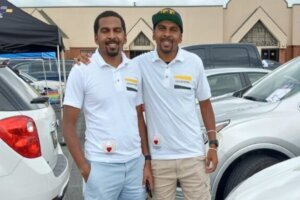
What few voters there were in the parking lot may have thought they were seeing double Thursday when Caylin Young, a candidate for the House of Delegates, approached them. Young was accompanied by his twin brother, Calvin Young — who had begun running for a House seat in Baltimore County this year, but eventually withdrew from the race.
“It’s good because I can help you,” Calvin Young told his brother.
Because there were so few voters to greet, the brothers had plenty of time to discuss campaign strategy. They decided that once their small cadre of campaign workers had finished their lunch, they would dispatch them door knocking rather than have them handing out literature in the parking lot.
“These guys are young,” Caylin Young said. “They just want to go, go, go.”
Five miles away at another Baltimore City early voting center, at the League for People With Disabilities near Morgan State University, there was a slightly steadier stream of voters and plenty more volunteers and candidates. By the end of the day, it would be the busiest voting center in the city, with 437 votes cast.
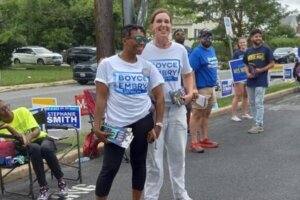
Del. Regina Boyce (D-Baltimore City) said it has been far tougher to get Baltimore voters interested in the primary than it was four years ago, when many people were animated by several competitive Democratic primaries for state Senate.
“It’s been hard. It’s been interesting,” she said. “I want people to know what’s going on [with the primary], so we keep talking.”
Boyce said she was worried because several voters she has encountered believe they have three choices for the House of Delegates this year, even though the district has been chopped into a subdistrict with two seats. Boyce and another candidate for the House, attorney Elizabeth Embry, are campaigning as a ticket in the Democratic primary. A third strong candidate, Logan Endow, is running with the support of the district’s state senator, Mary Washington (D).
Denizens of the parking lot outside the League for People With Disabilities stopped their chatting and snapped to attention when a black Tahoe SUV pulled in and deposited Wes Moore and his family as they prepared to vote. Out of nowhere, Moore staffers produced a Bose sound system that blared the classic McFadden and Whitehead 70’s hit, “Ain’t No Stoppin’ Us Now.”
Does the candidate always travel with a soundtrack? a reporter asked a staffer.
“Whenever we can,” he replied.
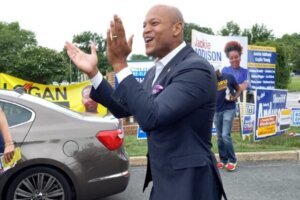
Moore, his wife Dawn, and their children, Mia and Jamie, greeted friends, supporters and strangers with great enthusiasm. They were equally effusive greeting the election judges at the voting center. Moore and Mia pored over the ballot for a long time, as did Dawn and Jamie.
Moore, a first-time candidate, described the phenomenon of voting for himself as “surreal. This has been a long but amazing journey.”
Moore said he wanted to come out on the first day of early voting to encourage others to vote early.
“Maryland makes it easy to vote in multiple ways, and we just want people to come out,” he said.
In the parking lot, the Moores greeted two of the brainiest graybeards of Maryland politics, former Secretary of State John Willis, who engineered former Gov. Parris Glendening’s victory, and attorney Larry Gibson, a mentor to generations of Baltimore politicians.
“You have any recommendations before I vote?” Gibson teased Moore. Gibson and Willis then fell into a deep conversation about early turnout numbers and their possible significance.
The biggest hub of activity in the state on Thursday was Prince George’s County, where 3,365 county residents cast ballots.
At the Wayne Curry Sports and Learning Center in Landover, dozens of campaigns had workers in brightly-colored T-shirts passing out literature. Hundreds of signs lined Brightseat Road, the driveway leading up the facility and seemingly every foot of green space within a quarter mile.
One sign — for a sheriff candidate — required a gas-powered compressor to keep it aloft. Many campaigns erected tents to give workers respite from the sun.
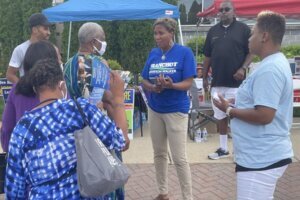
Monique Anderson-Walker (D), who is running for lieutenant governor on a ticket headed by Comptroller Peter Franchot (D), worked the crowd. A voter who arrived clutching literature that had come in the mail stopped to chat. “What are you going to do,” the woman asked Anderson-Walker pointedly. The candidate described issues she championed as a member of the county council, stressing that she was a relative newcomer and not a career pol.
“It’s exciting. This is what we’ve been waiting for,” Anderson-Walker told a reporter. “It’s exciting to look voters in the eye and hear what their concerns are.”
One voter, who declined to give her name, said she voted on the first day because she “wanted to get it done.” She said she was determined to vote because of the recent Supreme Court decisions on abortion and guns.
“I don’t know if any of these candidates are going to help, but we’ve got to hope and pray,” she said.
Candidates fanned out throughout the state.
In the early morning hours, two gubernatorial contenders who were both part of President Barack Obama’s cabinet found themselves at the Silver Spring Civic Center.
Former U.S. Education Secretary John King talked to voters and campaign workers, before heading to a campaign press conference to announce a 100-day plan to protect and expand access to abortion care in Maryland.
Their priorities would include providing housing for “abortion refugees” traveling from out of state through the Department of Emergency Management and establishing a “deputy secretary for reproductive rights” at the state’s health department.
Perez, who was Obama’s secretary of labor, wore a red polo shirt and spoke to reporters in Spanish before dropping off his mail-in ballot at a dropbox outside the building.
Perez said he was optimistic about his chances.
“I feel like we’re peaking at the right time,” Perez said. “People are paying attention.”
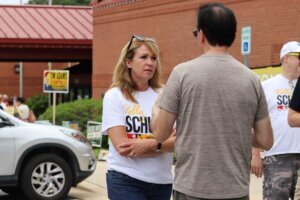
Republican gubernatorial hopeful Kelly Schulz toured early voting centers in Frederick County, where she lives, and upper Montgomery County.
She stopped by the Activity Center at Bohrer Park in Gaithersburg after lunch, and was greeted by a few reporters and a sea of campaign signs. It was her fourth stop of the day.
“There’s been very little voter turnout that I have seen when I’ve been out at the different stops,” Schulz said.
When she did get the opportunity to talk to voters — including one undecided Republican who was handing out campaign literature for a slate of school board candidates — Schulz was pitching herself as the candidate with “proven experience to be able to get things done in Maryland and provide that balance in Annapolis that really needs to happen.”
Asked about two recent Supreme Court opinions — to overturn Roe v. Wade and state laws that required “good cause” to receive concealed gun permits — Schulz said she’s heard more about those issues from reporters than from voters.
She said again that while she’s personally pro-life, Maryland law protects abortion access and “nothing’s going to change under my leadership as governor.”
On the change to Maryland concealed carry permits, Schulz applauded Hogan’s announcement to change state law to bring it in line with the high court’s decision. Asked whether she would support legislation expanding restrictions on where Marylanders could carry concealed weapons in light of the new ruling, Schulz said she “would have to see the bills as they come through.”
In Middle River in East Baltimore County, a trickle of voters — mostly Republican — came by to vote at the Victory Villa Community Center.
A Vietnam veteran with a “Redneck Sportsmen” T-shirt, who did not want to give his name, also didn’t want to say who he had voted for in the GOP gubernatorial primary, but he reassured two state lawmakers on hand, state Sen. Johnny Ray Salling and Del. Bob Long, that they were among his choices.
Salling predicted his district would go heavily for Del. Dan Cox in the Republican primary for governor, “because a lot of people here like Trump.” Salling said he is neutral in the primary between Cox, Schulz and two others, but said he would vigorously support either Cox or Schulz in the general election. Salling said he expects the early voting turnout to pick up on Friday night, Saturday, and on the final day, July 14.
Nicolee Ambrose, the Republican National Committeewoman for Maryland and a GOP candidate for Congress in the 2nd District, came to Middle River straight from the Perry Hall early voting station, complaining that her campaign signs, which volunteers had put up in the wee hours of the morning, had been removed.
“Luckily,” she said, “they have plenty of cameras there, so the mystery should be solved soon.”
Like other candidates, Ambrose said It’s tricky to get people vote in a summertime primary and said the campaigns are scrambling to reach voters where they are — whether they get their news online, from cable TV, or from a more traditional source.
“We’re trying to reach voters in so many ways — trying to reach them in every possible way,” she said.
At the polling station at Dundalk High School, not a single voter turned up during a 20-minute period at the dinner hour. Campaign workers chatted amiably and waited. Nearby, half a dozen teenagers, soccer ball in hand, crossed the school parking lot. It was clear they had no intention of voting.



